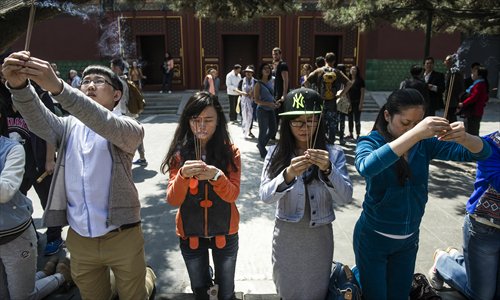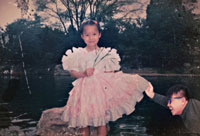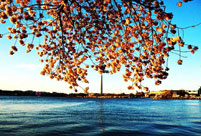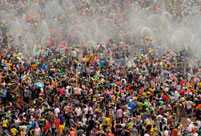 10 low-carbon tips to save money
10 low-carbon tips to save money
 Luxury cars make Asia premiere at Auto China
Luxury cars make Asia premiere at Auto China
 Versatile dog
Versatile dog
 Ni Ni covers BAZAAR JEWELRY
Ni Ni covers BAZAAR JEWELRY
 Cherry blossoms reach peak bloom in Washington D.C.
Cherry blossoms reach peak bloom in Washington D.C.
 Top Chinese fashion icons in foreigners' eyes
Top Chinese fashion icons in foreigners' eyes
 Asia's largest business aviation exhibition to be held in Shanghai
Asia's largest business aviation exhibition to be held in Shanghai
 World's top-rated luxury hotels
World's top-rated luxury hotels
 Wu Jing, Xie Nan to hold wedding on May
Wu Jing, Xie Nan to hold wedding on May
 London Cake International attracts tourists
London Cake International attracts tourists
 |
| Young people burn incense at the temple. |
Belief in Tibet
Located just west of the capital's Yonghegong Lama Temple is a Tibetan-style bar. Tibetan ornaments hang over windows and doors and photos of Tibet are hung on the walls painted with red and blue, making the 30-square-meter bar look more lively. Everything in the bar, from the tables to the benches, from the prayer flags to the Thangka paintings, has been brought from Tibet.
Every day after dawn, the bar is packed with young Chinese people, tourists and foreigners seem to erupt from the ground in groups of twos and threes.
One of the owners is 32-year-old Tu Huan from Chongqing, who practices Tibetan Buddhism. In 2010, the former IT worker quit his job, left everything behind and went to Tibet to "find himself."
"I was overwhelmed with my work, I wanted to slow down and think about what I really wanted in life," Tu told the Global Times.
In half a year, Tu exposed himself to the "mysterious" Tibetan culture and found himself touched by its environment and religion.
"I was stunned by those persistent prayers," he said. "It is hard for young people nowadays to be persistent at doing anything."
After mulling what he wanted in life, Tu came back to Beijing in 2010 and opened a Tibetan-style accessory shop with his friend. Three years later, they opened a bar next door, so people could discuss their beliefs.
Each year, millions of visitors travel to Tibet from elsewhere in China and abroad. Lots of young people like Huang and Tu travel to Tibet to find faith, or just to leave home for a break.
"Young people have traveled so often to Tibet that it is not cool anymore," Tu said. "It doesn't matter why you go to Tibet, it matters what you gain from Tibet."
Huang Yufan, 32, from Shenzhen, Guangdong Province said she felt a strong interest in Tibetan Buddhism after traveling to Tibet last year.
"I was always curious to see what religious people are like," Huang told the Global Times. "And I was touched to see how seriously they take it."
She remembers an occasion when she was drinking at a tea house in Lhasa, the capital of Tibet, and the waiter forgot to serve her tea. A Tibetan young man who was sitting next to her poured her tea from his own tea pot, and kept refilling it again and again. She offered to pay him, but he did not take the money.
"If I were elsewhere in China, I would be alert if a stranger did that for me because I would assume he was definitely after something, but in Tibet people do it for no reason," she said.
In a country where milk powder is tainted, dirty oil is recycled as cooking oil and even pollution spreads to vital rice crops, a lack of faith is responsible, at least according to Huang.
"With the lack of faith, people don't feel bad about doing bad things, and some would use violence to solve problems," Huang said.
"And if you don't have faith, you can't deal with so many of these negative things in your daily life," she continued.


 Commando elite specializes in sign language
Commando elite specializes in sign language Man photoshops himself into girlfriend's childhood photos
Man photoshops himself into girlfriend's childhood photos Photo story: Stallholders at Beijing Zoo Wholesale Market
Photo story: Stallholders at Beijing Zoo Wholesale Market Artists on backstage
Artists on backstage Beckham launches fund to support youth soccer in China
Beckham launches fund to support youth soccer in China Cherry blossoms hit peak bloom in Washington D.C.
Cherry blossoms hit peak bloom in Washington D.C. Children in ancient costumes learn Zhusuan
Children in ancient costumes learn Zhusuan Tens of thousands celebrate Water Splashing Festival
Tens of thousands celebrate Water Splashing Festival A bite of China II whets the appetite
A bite of China II whets the appetite Richest Chinese of 2014: half from the mainland
Richest Chinese of 2014: half from the mainland Chengdu - laid-back lifestyle makes happiest city
Chengdu - laid-back lifestyle makes happiest city The backstage of the Fashion Week
The backstage of the Fashion Week College students in Han costumes
College students in Han costumes Postgraduate works as waitress
Postgraduate works as waitress Life in a Lahu village in Yunnan
Life in a Lahu village in YunnanDay|Week|Month